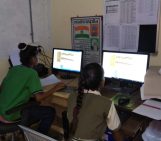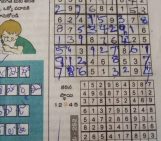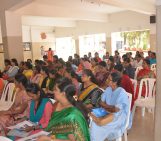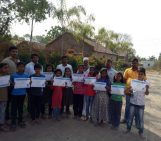In this information era, Computational Thinking (CT) has been identified as a critical skill to be developed in children during the school years. CT advances the notion that the mathematics and science behind computer science go far beyond the simple ability to use computers, and can be taught and discussed in schools even without the use of computers. The Association for Computing Machinery (ACM) India started an education initiative, CSpathshala (www.cspathshala.org) in 2016, to teach computing as a science in all schools. The key objectives are to popularise Computational Thinking (CT) and influence education policy to enable its introduction into the curricula. CSpathshala advocacy efforts paid off and the National Education Policy 2020 recommends that computational thinking be taught from foundational stages. CT curriculum has been piloted by 4,00,000+ students in 1200 schools across 11 states in 4 languages and Tamil Nadu SCERT has adopted the unplugged computational thinking curriculum as part of its mathematics curriculum for 30,000 schools from 2018.
CTiS (Computational Thinking in Schools)
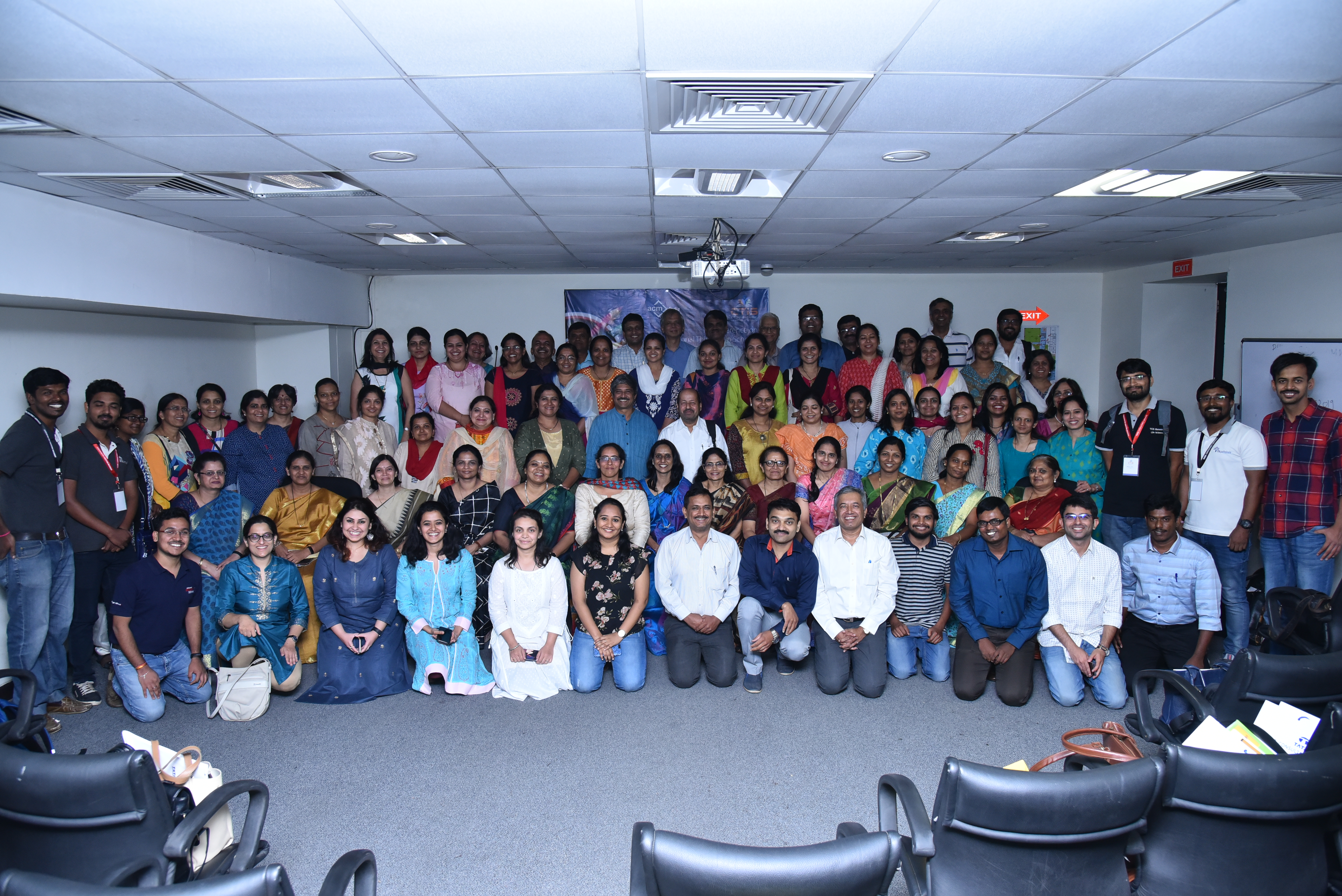
The first of its kind conference, Computational Thinking in Schools (CTiS) was organized by CSpathshala in 2019. CTiS aims to provide a platform for teachers, educators and researchers to share innovations, experiences and best practices and to discuss issues of curriculum, pedagogy, policy and implementation of CT. CTiS2019 in April 2019 saw the participation of 150+ educators, with 55 abstracts submitted and 9 were selected by the program committee for presentation. Owing to the pandemic, the second conference, CTiS2020, was held as a virtual event in October 2020. We had 307 abstracts submitted, two regional rounds, and the program committee shortlisted 14 for presentation. CTiS2020 saw participation of more than 1000 delegates which included teachers, Principals, educators and organisations working in the field of education from across 15 countries.
Due to the pandemic in 2020, the schools had new challenges and priorities to function in the virtual mode. To maintain interests in CT, CSpathshala pivoted teacher development programs, and conducted a (virtual) webinar series featuring international experts including Tim Bell, Jonaki Ghosh, Dan Garcia, Jeannette Wing and Valentina Dagiene. We learned about the CTE-STEM International Teachers Forum, thanks to Valentina, founder of the international Bebras Challenge. CTE-STEM is organized by the Asia-Pacific Society for Computers in Education (APSCE) and the 2021 edition was hosted by the National Institute of Education, Nanyang Technological University (NIE/NTU) from 2nd to 4th June 2021. We identified four abstracts submitted to CTiS2020, which could be mentored and submitted to CTE-STEM2021.
CTiS2020 to CTE-STEM2021
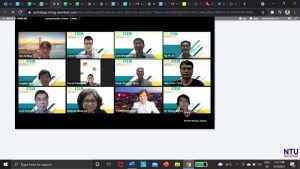
CTE-STEM 2021 International Teachers Forum received a total of 29 papers by 59 authors from 6 countries/regions and all the 4 abstracts we submitted were selected for presentation. (Link to proceedings of abstracts) In fact, one of them, by Pooja Palaparthi, was selected for CTE-STEM 2021 Best Paper Award.
The four abstracts submitted represented different CT implementation models, which included :
- CT curriculum as a vocational subject — in rural government residential schools in Andhra Pradesh
- CT as part of non-scholastic subject — in an urban elite school in Kochi
- CT as part of Math curriculum — in an urban government school in Chennai
1. CT curriculum as a vocational subject
In Andhra Pradesh, The Computational Thinking (CT) curriculum is being taught to 200,000 students in 427 APSWREIS (Andhra Pradesh Social Welfare Residential Educational Institutions Society) Social Welfare, Tribal Welfare and Ashram schools across classes 5 to 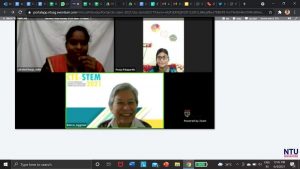 12 in partnership with CSpathshala since 2018. Majority are first-generation continuous school-goers belonging to socio-economically marginalized communities with an annual family income of less than ₹. 100,000.
12 in partnership with CSpathshala since 2018. Majority are first-generation continuous school-goers belonging to socio-economically marginalized communities with an annual family income of less than ₹. 100,000.
We had two abstract submissions from AP Social Welfare schools, Pooja Palaparthi, (from Narsipatnam) and Lakshmi Durga Petta (from Godi ).
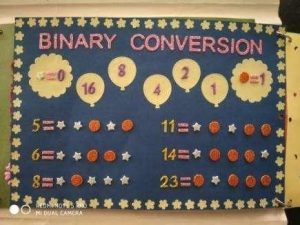
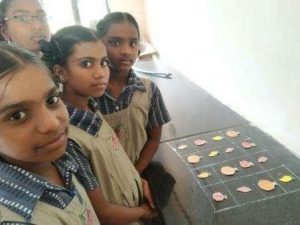
Pooja Palaparthi’s paper “Computational Thinking Implementation in Schools – An experience with Rural Welfare Schools in India”, describes the approach used in implementation of unplugged activities through localization to overcome the challenges of language and culture. Pooja used art and craft for variations and physical activities to describe Sudoku, patterns and counting combinations which increased the participation of the students and made learning fun. The students used their newly learned CT skills and creativity to create activity books, a repository that includes topics like Counting Combination, Sudoku, Missing Number Pyramid, Sorting, Patterns in Words, Pattern in Numbers, Pattern in Shapes, Morse Code, Odd Man Out and Binary Conversion. After Pooja presented the abstract in CTE-STEM2021, she shared with us that participating in an international conference was a new experience which she hopes will help her in enriching her teaching skills.
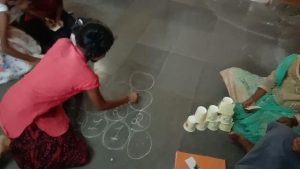 Lakshmi Durga Petta, through her paper on “Computational Thinking and Unplugged Activities: Localization enabling learning”, shared her experience on teaching students the concepts of systematic counting, listing and reasoning through the missing numbers activity. One of the classroom activities described was the Number challenge and Pyramid puzzle. She used an activity involving paper cups arranged in a pyramid shape to demonstrate the puzzle. Lakshmi shared that her first time participation at CTE-STEM2021 conference provided an opportunity for learning new things which will be very valuable to her future teaching skills.
Lakshmi Durga Petta, through her paper on “Computational Thinking and Unplugged Activities: Localization enabling learning”, shared her experience on teaching students the concepts of systematic counting, listing and reasoning through the missing numbers activity. One of the classroom activities described was the Number challenge and Pyramid puzzle. She used an activity involving paper cups arranged in a pyramid shape to demonstrate the puzzle. Lakshmi shared that her first time participation at CTE-STEM2021 conference provided an opportunity for learning new things which will be very valuable to her future teaching skills.
2. CT as part of non-scholastic subject
Susanna Sunil, from Global Public School, Kochi, Kerala presented her paper, “Rethinking Computational Thinking Implementation in K-12 and 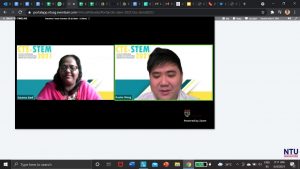 Challenges Faced”. It describes the integration of Computational Thinking curriculum in phases across Grades 1 to 8, the implementation and the challenges faced. She described phases of the curriculum before CSpathshala, immediately after adopting CT curriculum, and with finer modifications after obtaining feedback from the stakeholders: students, parents and teachers. She explained how the team reworked on integrating CT activities with tools like word processors and spreadsheets. One of the challenges faced by educators is that the existing school curriculum is too crowded to add a new subject. The time allotted for ICT across Grades 1 to 8 was restructured to teach computational thinking side by side with computer literacy. Susanna shared that writing a paper for the CTE-STEM conference has been an intensive, introspective but extraordinary experience. The task of compiling work done across a period of time into a single document, and also connecting the dots based on the patterns observed in the data was both exhausting but exciting in equal measure.”
Challenges Faced”. It describes the integration of Computational Thinking curriculum in phases across Grades 1 to 8, the implementation and the challenges faced. She described phases of the curriculum before CSpathshala, immediately after adopting CT curriculum, and with finer modifications after obtaining feedback from the stakeholders: students, parents and teachers. She explained how the team reworked on integrating CT activities with tools like word processors and spreadsheets. One of the challenges faced by educators is that the existing school curriculum is too crowded to add a new subject. The time allotted for ICT across Grades 1 to 8 was restructured to teach computational thinking side by side with computer literacy. Susanna shared that writing a paper for the CTE-STEM conference has been an intensive, introspective but extraordinary experience. The task of compiling work done across a period of time into a single document, and also connecting the dots based on the patterns observed in the data was both exhausting but exciting in equal measure.”
3. CT as part of Math curriculum
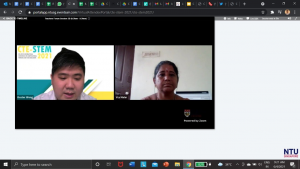 Computational Thinking (CT) curriculum has been introduced as part of Mathematics in the formal state government curriculum since the academic year 2018-19 across Grades 1-8 in nearly 30,000 schools within Tamil Nadu. Malarvizhi, Greater Chennai Corporation, Tamil Nadu (TN) and Krithika Krishnamoorthy, Azim Premji University, presented their paper on, Integration of Computational Thinking in Upper Primary (Grade 6-8) Math in Tamil Nadu. This paper describes the process of integrating CT components in the Math curriculum, in Grades 6-8. “Data Handling” was replaced by “Information Processing” track with a focus on problem solving and data organization and is part of school textbook content. The paper described several specific examples that illustrated the concepts of the new curriculum. The illustrations ranged from choosing different paths to reach the school, choosing different ways to wear a pair of shirt and pants, optimizing the purchase of items in the market and so on which, she said, brought smiles on the faces of the children when learning these concepts. The paper also spoke on the pedagogical shift after the integration of CT components following the light of TN curricular goals.
Computational Thinking (CT) curriculum has been introduced as part of Mathematics in the formal state government curriculum since the academic year 2018-19 across Grades 1-8 in nearly 30,000 schools within Tamil Nadu. Malarvizhi, Greater Chennai Corporation, Tamil Nadu (TN) and Krithika Krishnamoorthy, Azim Premji University, presented their paper on, Integration of Computational Thinking in Upper Primary (Grade 6-8) Math in Tamil Nadu. This paper describes the process of integrating CT components in the Math curriculum, in Grades 6-8. “Data Handling” was replaced by “Information Processing” track with a focus on problem solving and data organization and is part of school textbook content. The paper described several specific examples that illustrated the concepts of the new curriculum. The illustrations ranged from choosing different paths to reach the school, choosing different ways to wear a pair of shirt and pants, optimizing the purchase of items in the market and so on which, she said, brought smiles on the faces of the children when learning these concepts. The paper also spoke on the pedagogical shift after the integration of CT components following the light of TN curricular goals.
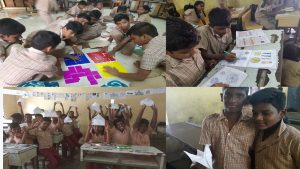 Malarvizhi shared, ”This is my first international conference presentation and is an evergreen experience for me. The conference participants appreciated seeing the happy faces of our students in the presentation, which demonstrated to them the eagerness of the students to learn CT concepts. Their comments were very encouraging”. Krithika shared, “The process of presenting paper is indeed a beautiful experience. I enjoyed the whole process, right from writing the abstract, going through several reviews, incorporating changes suggested by the reviewers…till presenting. We had a great chance to listen to experts’ talk and get ideas from them too.”
Malarvizhi shared, ”This is my first international conference presentation and is an evergreen experience for me. The conference participants appreciated seeing the happy faces of our students in the presentation, which demonstrated to them the eagerness of the students to learn CT concepts. Their comments were very encouraging”. Krithika shared, “The process of presenting paper is indeed a beautiful experience. I enjoyed the whole process, right from writing the abstract, going through several reviews, incorporating changes suggested by the reviewers…till presenting. We had a great chance to listen to experts’ talk and get ideas from them too.”
Conclusion
The teachers implementing CT are a mix of computer and Math teachers from across urban and rural schools in India, who were initially hesitant to share their experiences in teaching CT with the teachers community. Their journey began with various training programs CSpathshala conducted to the first CTiS in April 2019. We received 55 abstracts from 5 states in CTiS2019, which grew phenomenally to 307 abstracts across 6 states in 2020.
It was an enriching experience to mentor these teachers who hitherto had very little opportunity to share their experience with anyone, leave alone to a conference full of international experts in a language that is not their native language. One of our teachers winning the best paper award in an international conference gives us confidence that CTiS is on the right path. This is of course the beginning, and we have a long way to go before CT penetrates to a majority of school curriculum and the quality of content, pedagogy and presentation improve substantially. We also hope that CTiS will provide a model for more such avenues for teachers to share their experiences.
Preparations for CTiS2021 are underway (see http://cspathshala.org/events/ctis-2021-annual-computational-thinking-conference/) and we hope to see you all virtually in CTiS 2021!
Sonia Garcha and Venkatesh Raman
Program Committee Co-Chairs, CTiS2020

